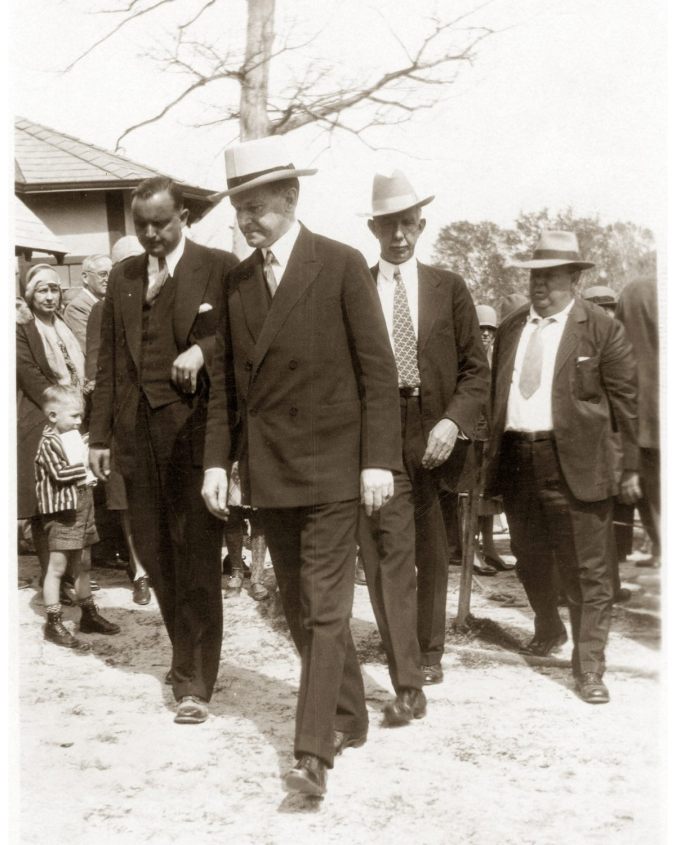
Former President Coolidge, in motion, heading to his next destination: Lakeside Inn in Mount Dora, Florida (1930).
As usual, “the experts” in crisis mode reveal to us who they are and what they think. Often, it is done unconsciously. One of those catchphrases gathering currency is the notion that the economy, usually with the passage of some legislation or political initiative, can simply be “reopened” and resume right where it left off. As if we are all voluntarily able to hit the pause button on the various matters of life and with the wave of a wand every store will reopen, all personnel will come back, every last dollar of wages will continue as before, the same levels of production and consumption will return, and market trends will resume where they stood. It will be be like nothing happened. Or so “reopening” the economy assumes.
The economy is treated, as technocrats often do so, as an inanimate, even static, object…something that is difficult to find anywhere in nature but, conveniently, exists in their conception of the economy — not prone to contraction or expansion, nor to constant changes of human valuation, the ever-moving factors of life and time. Experts have removed all those messy, inconvenient things that get in the way of the plan. Or so they talk as if such can be or has been accomplished. Talked about like some abstract entity, we are catching a glimpse of how ignorant, intentional or not, technocrats are about that most unpredictable of things called the “real world,” and the very living thing in it we know as the marketplace. It is not some asset in clean containment conditions somewhere being fine-tuned and perfected by experts in white lab coats who control its every move and ensure it responds perfectly to the plan of a given model or spreadsheet.
In truth, it is driven by no one single authority or hand at all, comprised as it is by millions of human valuations, sudden whims, careful decisions, interests, wants, needs, and so many unquantifiable resources that simply defy Linnaean order. All of it will never be entirely understood, let alone clinically measured, classified, and quantified according to a system of workable priority, importance or objective value handed down from any central office anywhere. Every time an economy is looked upon this way, it leads to even more avoidable suffering. There will be enough and has been enough without adding technocratic stupidity to the mix.
Someone has written that this is a voluntary closure of the economy. As if we are all holding our breath for a little while just to take things up exactly as before when the situation clears. Only one problem, the conditions we face today are not going to remain the same tomorrow. Life isn’t a Marvel Comics hero, who can enter and exit suspended animation with ease. It alters by the hour, if not the moment. Businesses will not all reopen and be at the same optimal levels of output and payroll they were to please commercial reports. Jobs are not abstract numbers stuck in the upward position. Wages are not frozen things that can be kept under ice somewhere until an economist or politician needs them for a talking point. The economy is a dynamic, ever-shifting, continually fighting creature who defies the attempt to tame it. It doesn’t know what “static conditions” even mean. They don’t exist. Not everyone will walk right back into the same job, the same pay, the same situation that was there before the upheaval. These things will keep changing and we will witness a very different economy driven by different values that have not been put in a cyrogenic chamber to arrest physics or halt alteration. What will be there when this is all over will not be the same as existed before because life itself doesn’t stop however much we wish we could legislate or regulate it so. No agency, Governor, President or Congress can change that.
Calvin Coolidge weighed in on this many times, but this excerpt from his July 29, 1930 column on economics and price fixing seems especially apt today. He was no fool but neither did he suffer fools without some deserved rebuke, so for April Fools’ Day read what he said:
It is not possible to repeal the law of supply and demand, of cause and effect, or of action and reaction. Value is a matter of opinion. An act of Congress has small jurisdiction over what men think.
When the consumer buys a product it goes out of the market and disappears. When private or public agents buy to fix an arbitrary price the product is still in the market, every consumer knows it and waits for the resale. The price can be held only as a local or temporary expedient which usually makes matters worse. But because all of us are bigger than some of us, not even the United States Treasury is powerful enough to put an arbitrary price on the great world staples with any permanent success.
So, before we entertain notions of “reopening” a “static” economy, remember it hasn’t and it won’t stay where we left it…like a well-trained pet rock. Consider, too, what Cal once asked, as he held an old parchment from the 1780s issued by the Selectmen of Belchertown, Massachusetts, when they attempted to maintain a “static” economy for themselves, “Isn’t it a strange thing that in every period of social unrest, men have the notion that they can pass a law and suspend the operations of economic law?”
Indeed, it is.